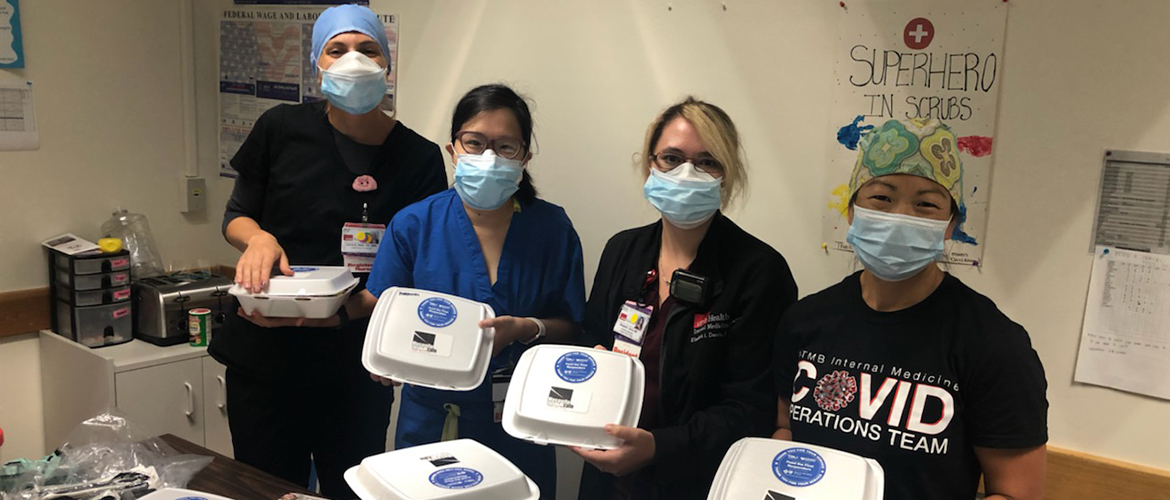The coronavirus’ near shut down of the nation has forced Galveston, TX, restauranteur James Clark to become more innovative while awaiting return of the masses of people who contribute to the coastal city’s $1.2 billion tourism industry.
His family’s independent restaurant, the Mosquito Café, has expanded outdoor seating into the parking lot to safely serve nearly 70 guests as Texas has eased restrictions implemented to curb infection spread. Most of its 20-member staff is working, but the restaurant is at 60% of its normal business.
“The goal right now is to keep everyone as safe as possible and hope they keep coming,” says Clark, whose restaurant serves a variety of dishes. “We’re seeing quite a volume of people coming down to Galveston just for the day. But a lot of people still feel nervous and scared.”
A Texas Restaurant Association Education Foundation Relief Fund grant he received could bolster business — and help feed those who are fighting the virus’ spread. The association, with support from Health Care Service Corporation's Texas plan, established the Collaborative Grant Fund to keep restaurants open, while providing first responders and health care workers statewide with meals to show appreciation for their dedication during the outbreak.
“They’ve been helping our business, and this is an opportunity to turn that around and show our love and appreciation to them.”
Clark fed nurses, faculty and medical residents and fellows at the city’s largest employer, the University of Texas Medical Branch at Galveston, home to several hospitals, the Galveston National Laboratory and the Institute for Human Infections and Immunity where COVID-19 vaccine research is being conducted.
“That’s who we want to really take care of,” he says. “They’ve been helping our business, and this is an opportunity to turn that around and show our love and appreciation to them.”
The grant program will provide meals to an estimated 150,000 first responders and health care workers, while helping to support more than 100 independently owned restaurants, as well as 670 Whataburger and about 220 Chipotle locations. So far, meals have been served in more than 200 of the state’s 254 counties.
“We have a long history of supporting community organizations, and, now more than ever, it’s important to support the areas where our communities need it the most,” says Dr. Dan McCoy, president of HCSC's Texas plan. “Through these grants, we are working to move resources to community-based organizations that are directly supporting local residents and families who are most impacted by the emerging health, economic and social impacts from the COVID-19 pandemic.”
Galveston, with a population of about 50,000 and the county seat of Galveston County, has been especially hard hit economically by the outbreak. An island city on the Gulf of Mexico, it’s a tourist destination. One in three residents has a tourism-related job, including food service work.
Countywide, full-service and limited-service restaurants are among the industries with the highest number of unemployed workers, the Texas Workforce Commission’s most recent data shows.
In Texas, the food service industry is a $52.4 billion business and accounts for 12% of the state’s employment. Statewide, almost 67,000 employees of full-service restaurants have filed for unemployment, according to the commission.
“The COVID-19 pandemic has caused an incredible challenge for restaurants,” says Emily Williams Knight, president and CEO of the Texas Restaurant Association and Education Foundation. “A critical component of the food supply chain, restaurants are the hearts of our communities and are in a fight for survival.”
Warren and Jenny Smith are among the state’s independent restaurant owners who have benefitted from the grant program. The owners of the Texan Café and Pie Shop in Hutto provided lunch to about 100 employees at Texas Oncology in nearby Round Rock where Jenny Smith is a hematology patient.
“They have been working to make sure their patients can safely get treatment and the care they need in the middle of all this,” she says. “They are dog tired.”
Known for its comfort foods and wide pie selection, the small restaurant about 40 minutes northeast of Austin relied on carryout service to stay afloat before the state eased restrictions. Jenny Smith says she and her husband are grateful for the grant and the community’s support during the outbreak.
“Anything helps right now, and we’ve gotten to help some of these first responders,” she says. “We’ve just been so blessed. Who are we if we don’t bless others?”

